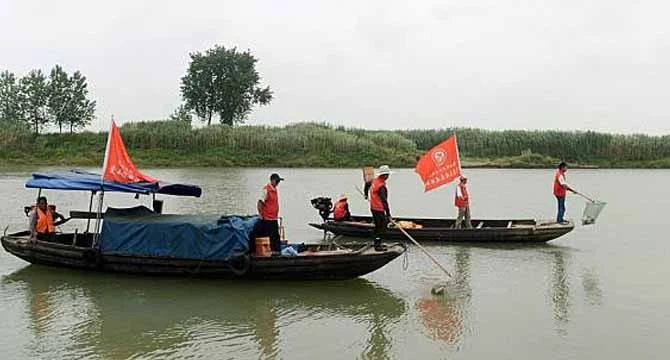HEFEI, March 23 (Xinhua) — As the chilly spring breeze lightly brushed their cheeks, a father and his son stood on the deck of a boat on the Yangtze River, known as a “mother river” of the Chinese nation. This is just another ordinary workday for them.
For 17 years, Zhang Pinghe, the 58-year-old father, has dedicated himself to collecting ship waste along the Tongling section of the Yangtze River.
“See how clean the water is now. After years of waste collection, we seldom see rubbish on the surface of the river,” Zhang said.
Prior to this job, Zhang had worked in other positions. However, he was laid off in 2006 due to enterprise restructuring.
“My ancestors have been fishermen for generations, and the Yangtze River has nurtured us,” Zhang said. He recalled playing by the Yangtze River when he was a child. However, oil and garbage gradually polluted the clear and pristine water in the river.
Zhang then chose to start a water pollution prevention and control business. Two years ago, Zhang’s son, Zhang Zhongya, also joined the effort to protect the “mother river.”
Every day at 7 a.m., they set sail to collect garbage, waste oil, and sewage from ships on the Yangtze River.
With more and more ship owners volunteering to call the Zhang family to handle the waste on their ships, Zhang Pinghe said he really feels that public awareness of environmental protection is increasing, and he has seen the river become clearer over the years.
The 36th China Water Week started on Wednesday. The theme of China’s campaign commemorating World Water Day and China Water Week in 2023 is “Improved Water Governance by Law and Joint Efforts in Protecting Mother Rivers.”
To effectively protect the country’s two “mother rivers” — the Yellow River and the Yangtze River, China has adopted the Yangtze River Protection Law and the Yellow River Protection Law.
Over the years, strenuous efforts have been made to promote better protection of the rivers and enhance public awareness of water protection across the country in various forms, including constructing river cultural parks and strengthening environmental education.
In 2021, a 10-year fishing ban took effect in the pivotal waters of the Yangtze River to restore biodiversity. Many former fishermen have thus taken on new roles.
Holding a hand net, Xiao Lyuying, a 77-year-old former fisherman, and his fishing buddies drove a patrol boat on the Yangtze River to collect garbage instead of fishing. With no fishing boats or fishermen in sight, they can sometimes see fish pop out of the water.
Growing up in a township along the Yangtze River in Tongling City, east China’s Anhui Province, Xiao had been fishing with his father on the river since he was a teenager.
After the fishing resources dwindled, Xiao had to quit fishing and opened a shop. However, after seeing the garbage floating in the “mother river” a few years later, Xiao decided to gather a group of fishermen to voluntarily collect waste from the water.
Xiao said there are now more and more fish in the Yangtze River, and the chance of seeing finless porpoises, a barometer of the ecological environment in the Yangtze River basin, is also increasing.
“Our family protects the Yangtze River for livelihood, but not just for livelihood,” Zhang Pinghe said, adding that he wants to do his bit for future generations.

